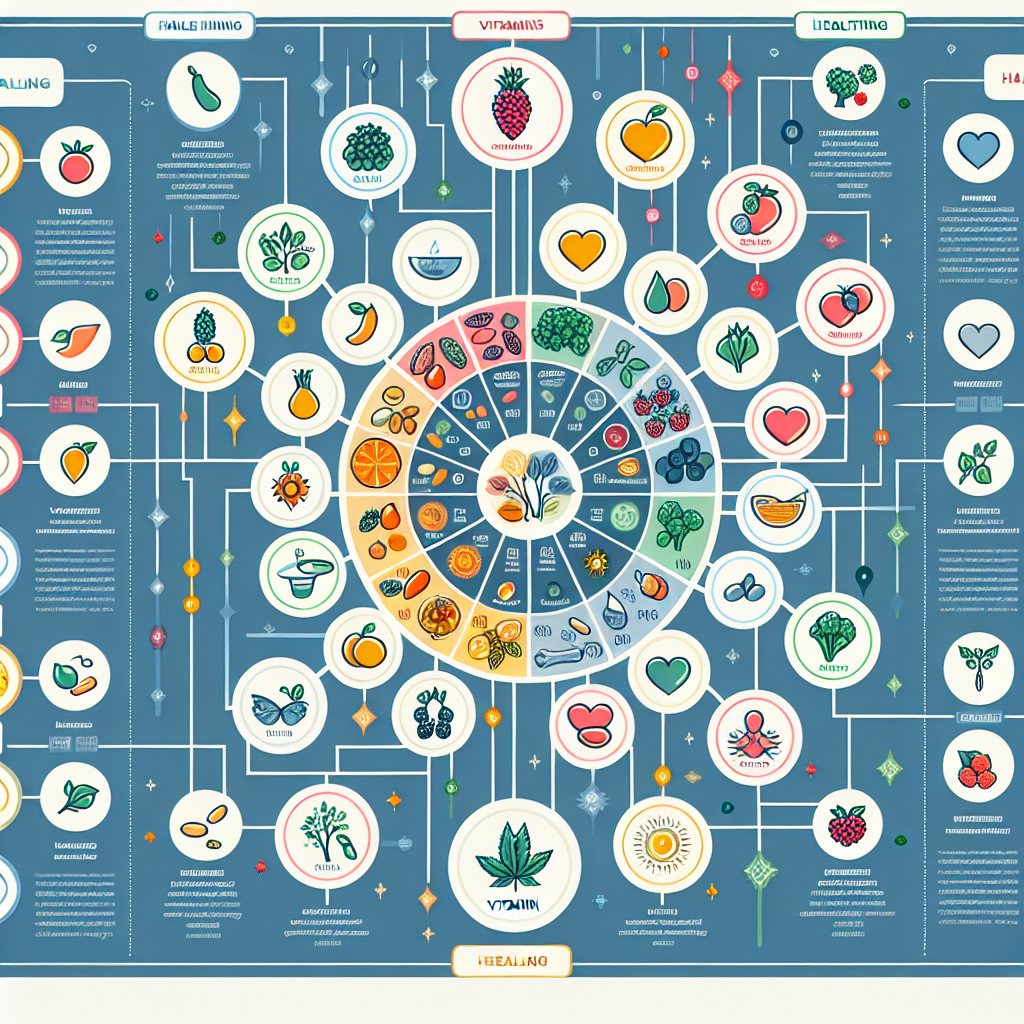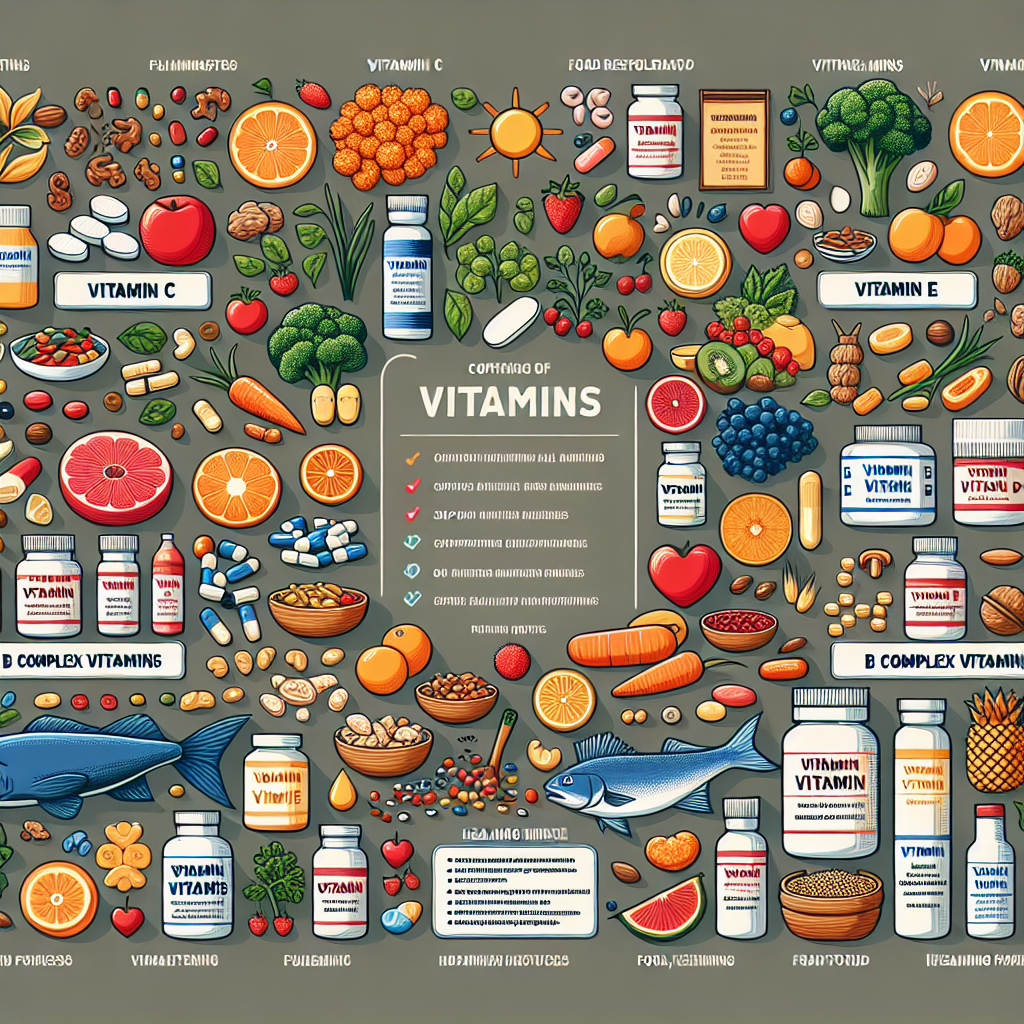Alternative Medicine: Which Vitamins Support Natural Healing?

Discover which vitamins support natural healing in alternative medicine. Learn more and enhance your health today. Click here to explore.
Exploring the Role of Vitamins in Natural Healing Processes
Alternative medicine has been gaining traction in recent years, with more and more people turning to natural remedies to support their health and wellbeing. One area of alternative medicine that has been particularly popular is the use of vitamins to support natural healing processes. The human body is a complex system that relies on a variety of nutrients to function optimally, and vitamins play a crucial role in many of these processes.
Vitamins are organic compounds that our bodies need in small amounts to maintain good health. They are essential for a variety of bodily functions, including growth, digestion, and nerve function. Some vitamins also have antioxidant properties, meaning they can protect our cells from damage. This is particularly important when it comes to natural healing, as damage to our cells can impede the healing process.
One vitamin that is particularly important for natural healing is vitamin C. This vitamin is well-known for its immune-boosting properties, but it also plays a crucial role in wound healing. Vitamin C is necessary for the production of collagen, a protein that helps to form new skin and blood vessels. Without sufficient vitamin C, the healing process can be significantly slowed.
Another vitamin that supports natural healing is vitamin A. This vitamin is essential for the maintenance and repair of skin tissue. When you have a wound, your body needs extra vitamin A to help repair the damaged tissue and promote the growth of new skin. Vitamin A also has anti-inflammatory properties, which can help to reduce swelling and inflammation around a wound.
Vitamin E is another important vitamin for natural healing. It has strong antioxidant properties, which can help to protect your cells from damage. This is particularly important during the healing process, as damaged cells can slow down healing. Vitamin E also supports the immune system, helping your body to fight off infections that could potentially interfere with healing.
Vitamin K is also crucial for the healing process. It plays a key role in blood clotting, which is the first step in wound healing. Without sufficient vitamin K, your body may struggle to form clots, which could lead to excessive bleeding and slow down the healing process.
Finally, the B vitamins, particularly B6 and B12, also play a role in natural healing. These vitamins are involved in the production of red blood cells, which are necessary for delivering oxygen and nutrients to your tissues. Without enough B vitamins, your body may struggle to produce enough red blood cells, which could slow down the healing process.
In conclusion, vitamins play a crucial role in the natural healing processes of the body. They are involved in a variety of functions, from cell protection and immune support to tissue repair and blood clotting. By ensuring that you are getting enough of these essential nutrients, you can support your body’s natural healing processes and promote optimal health. However, it’s important to remember that while vitamins can support healing, they are not a substitute for medical treatment. Always consult with a healthcare professional before starting any new supplement regimen.
The Power of Vitamins: A Deep Dive into Alternative Medicine

Alternative medicine has been gaining traction in recent years as more and more people seek natural ways to support their health and wellbeing. One of the most popular forms of alternative medicine is the use of vitamins to support natural healing. This approach is based on the belief that the body has an innate ability to heal itself, and that by providing it with the right nutrients, we can enhance this natural healing process.
Vitamins are organic compounds that our bodies need in small amounts to function properly. They play a crucial role in various bodily functions, including metabolism, immune function, and cell growth. While we can get most of the vitamins we need from a balanced diet, some people may need to take supplements to meet their nutritional needs.
One of the most well-known vitamins for supporting natural healing is vitamin C. This powerful antioxidant helps to protect our cells from damage and plays a key role in the production of collagen, a protein that helps to heal wounds and maintain the health of our skin, bones, and connective tissues. Vitamin C is also known to boost the immune system, making it a popular choice for those looking to ward off colds and other illnesses.
Another vitamin that is often associated with natural healing is vitamin E. Like vitamin C, vitamin E is a powerful antioxidant that helps to protect our cells from damage. It also plays a crucial role in immune function and may help to reduce inflammation, making it a popular choice for those dealing with chronic conditions like arthritis.
Vitamin A is another key player in the world of natural healing. This vitamin is essential for maintaining the health of our skin and mucous membranes, which are our body’s first line of defense against pathogens. Vitamin A also plays a crucial role in immune function and is known to support eye health.
B vitamins, including B6, B9 (folic acid), and B12, are also important for natural healing. These vitamins play a crucial role in cell metabolism, helping our bodies to convert food into energy. They also support brain health and are known to help reduce the risk of certain types of cancer.
Finally, vitamin D is a crucial nutrient for supporting natural healing. This vitamin is known to support bone health, immune function, and mood. It’s also been linked to a reduced risk of certain types of cancer, heart disease, and multiple sclerosis.
While vitamins can certainly support natural healing, it’s important to remember that they are not a cure-all. A balanced diet, regular exercise, adequate sleep, and a healthy lifestyle are all crucial for maintaining good health. Additionally, while vitamins can be beneficial, they can also be harmful if taken in excess. It’s always a good idea to talk to a healthcare provider before starting any new supplement regimen.
In conclusion, vitamins play a crucial role in supporting natural healing and overall health. Whether you’re looking to boost your immune system, support your body’s natural healing processes, or simply maintain good health, vitamins can be a powerful tool in your wellness arsenal. However, they should be used wisely and as part of a balanced, healthy lifestyle.
Unveiling the Healing Potential of Vitamins in Alternative Medicine
Alternative medicine has been gaining traction in recent years, with more and more people turning to natural remedies to support their health and wellbeing. One area of alternative medicine that has been particularly intriguing is the use of vitamins to support natural healing. Vitamins, which are essential nutrients that our bodies need to function properly, have been found to have a significant impact on our health and can play a crucial role in the healing process.
Vitamin C, for instance, is renowned for its healing properties. It is a potent antioxidant that can protect our bodies from damage caused by harmful molecules called free radicals. Moreover, it is essential for the production of collagen, a protein that helps wounds heal. Vitamin C also enhances the immune system, enabling the body to fight off infections more effectively. Therefore, ensuring an adequate intake of this vitamin can significantly support the body’s natural healing processes.
Similarly, Vitamin D, often referred to as the “sunshine vitamin,” is another essential nutrient that can aid in natural healing. It is known for its role in bone health, as it helps the body absorb calcium, a mineral that is crucial for bone repair and growth. However, recent studies have also linked Vitamin D to wound healing. Research suggests that Vitamin D can help regulate inflammation and the formation of new blood vessels, both of which are critical processes in wound healing.
Vitamin A is another nutrient that has been associated with healing. It plays a vital role in maintaining the health of our skin, the body’s first line of defense against infection. Vitamin A is involved in the production and repair of skin cells and can help speed up the healing process of wounds and other skin conditions. Additionally, it supports the immune system, further enhancing the body’s ability to heal.
Vitamin E, on the other hand, is a powerful antioxidant that can protect cells from damage. It is often used in skincare products due to its ability to promote skin health and speed up the healing of wounds and scars. Vitamin E can also support the immune system, helping the body fight off infections and diseases.
Lastly, the B vitamins, including B6, B9, and B12, are essential for a healthy immune system. They help create and regulate immune cells, which are crucial for fighting off infections and promoting healing. Moreover, these vitamins are involved in the production of red blood cells, which carry oxygen to tissues and organs throughout the body, supporting their function and repair.
In conclusion, vitamins play a crucial role in supporting the body’s natural healing processes. They can help regulate the immune system, promote the repair and growth of tissues, and protect the body from damage. However, it’s important to remember that while vitamins can support healing, they are not a substitute for medical treatment. Always consult with a healthcare professional before starting any new supplement regimen. Alternative medicine, including the use of vitamins for healing, should be used as a complement to, not a replacement for, conventional medicine.